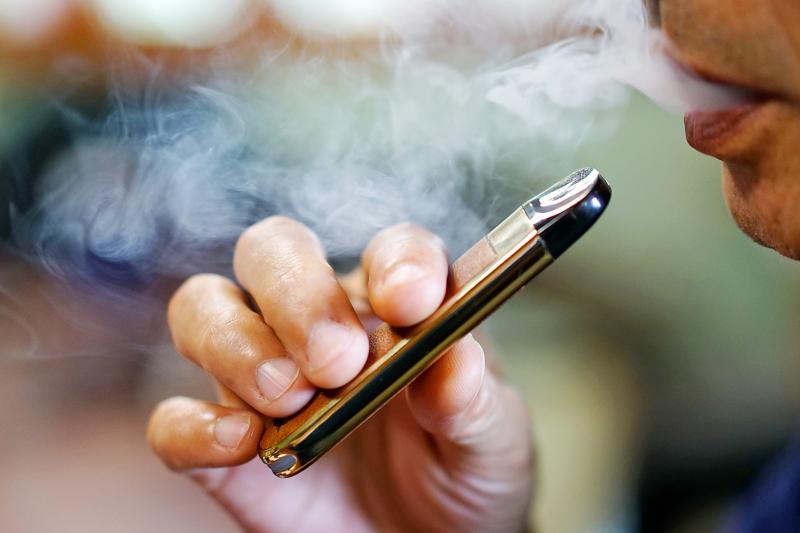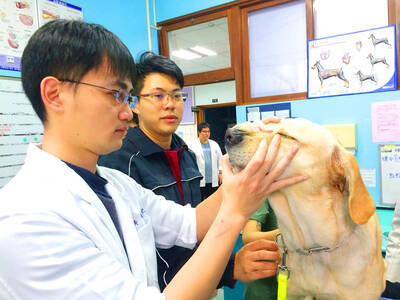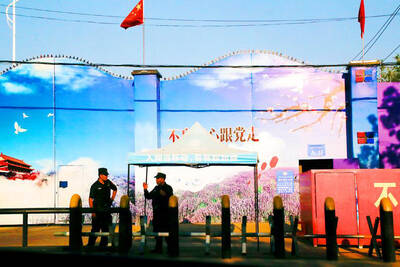Social media posts promoting the use of e-cigarettes — many targeting young people — have rapidly spread on various platforms, a study commissioned by the Health Promotion Administration (HPA) showed.
The study, which was conducted by Shih Hsin University, found that more than 6.8 million posts about e-cigarettes were added over the past year to Instagram, which is popular among young people in the nation, the HPA said.
Many of the posts included information on where to purchase e-cigarettes, it added.

Photo: Lin Ching-lun, Taipei Times
“None of these posts include health warnings. They don’t tell you that smoking just 30ml of e-cigarette oil is equivalent to smoking nine packs of cigarettes,” said Chen Mu-jung (陳木榮), a pediatrician at Your Doctor Clinic in New Taipei City.
E-cigarettes contain a higher concentration of carcinogens, like formaldehyde and acetaldehyde, than cigarettes, he said.
The HPA said that e-cigarette use among young people in Taiwan is on the rise, with 2.5 percent of junior-high school students having used the devices in 2019, up from 1.9 percent in 2018.
Similarly, an increasing number of high-school students are using e-cigarettes, with 5.6 percent using them in 2019, up from 3.4 percent in 2018, it added.
Opportunistic resellers are taking advantage of young people and trying to depict e-cigarettes as trendy on Instagram, the HPA said.
The study also found that e-cigarette resellers were using keywords like “ejuice” to evade censorship on social media platforms, said Chung Chi-hui (鍾起惠), a professor at the university.
The study also found that resellers were increasingly advertising the devices on online discussion forum Dcard, which is popular among Taiwanese university students, Chung said, adding that many advertisements contained misleading information, for example that e-cigarettes are a safe alternative to cigarettes.
The researchers also identified a correlation between the amount of money a student has at their disposal and the likelihood of them using e-cigarettes, she said.
Chung said that 10.8 percent of junior-high school students and 15.2 percent of high-school students who have NT$4,500 of pocket money per month at their disposal used e-cigarettes.
Comparatively, only 3.6 percent of junior-high school students and 4.3 percent of high-school students who have NT$1,500 to NT$2,499 per month used the devices, she added.
“We reported 140 posts related to e-cigarettes that had no reseller address to the Institute of Watch Internet Network, but only 36 of them were taken down,” she said, adding that the institute said it was in contact with the operators of social media platforms to discuss options to tackle the issue.
The institute is a government-funded organization that accepts complaints over online comments and forwards them to administrative agencies.
It is granted authority under the Protection of Children and Youths Welfare and Rights Act (兒童及少年福利與權益保障法).
Chung said that Web sites that allow users to post advertisements of e-cigarettes can be listed by the authorities as harmful to children, but cannot be blocked or taken down, she said.
“The majority of e-cigarette oils contain additives that are not approved by the Food and Drug Administration, and have incomplete or inaccurate labeling,” Chen said.
Many e-cigarette oil manufacturers also claim that their oils do not contain nicotine, but 80 of the oils sold in Taiwan have been found to contain nicotine, he said.
The use of e-cigarettes with oils that contain nicotine affects students’ ability to concentrate, Chen said.
Some students in South Korea have reportedly died from nicotine poisoning caused by excessive e-cigarette use, he said.

Former Czech Republic-based Taiwanese researcher Cheng Yu-chin (鄭宇欽) has been sentenced to seven years in prison on espionage-related charges, China’s Ministry of State Security announced yesterday. China said Cheng was a spy for Taiwan who “masqueraded as a professor” and that he was previously an assistant to former Cabinet secretary-general Cho Jung-tai (卓榮泰). President-elect William Lai (賴清德) on Wednesday last week announced Cho would be his premier when Lai is inaugurated next month. Today is China’s “National Security Education Day.” The Chinese ministry yesterday released a video online showing arrests over the past 10 years of people alleged to be

THE HAWAII FACTOR: While a 1965 opinion said an attack on Hawaii would not trigger Article 5, the text of the treaty suggests the state is covered, the report says NATO could be drawn into a conflict in the Taiwan Strait if Chinese forces attacked the US mainland or Hawaii, a NATO Defense College report published on Monday says. The report, written by James Lee, an assistant research fellow at Academia Sinica’s Institute of European and American Studies, states that under certain conditions a Taiwan contingency could trigger Article 5 of NATO, under which an attack against any member of the alliance is considered an attack against all members, necessitating a response. Article 6 of the North Atlantic Treaty specifies that an armed attack in the territory of any member in Europe,

LIKE FAMILY: People now treat dogs and cats as family members. They receive the same medical treatments and tests as humans do, a veterinary association official said The number of pet dogs and cats in Taiwan has officially outnumbered the number of human newborns last year, data from the Ministry of Agriculture’s pet registration information system showed. As of last year, Taiwan had 94,544 registered pet dogs and 137,652 pet cats, the data showed. By contrast, 135,571 babies were born last year. Demand for medical care for pet animals has also risen. As of Feb. 29, there were 5,773 veterinarians in Taiwan, 3,993 of whom were for pet animals, statistics from the Animal and Plant Health Inspection Agency showed. In 2022, the nation had 3,077 pediatricians. As of last

XINJIANG: Officials are conducting a report into amending an existing law or to enact a special law to prohibit goods using forced labor Taiwan is mulling an amendment prohibiting the importation of goods using forced labor, similar to the Uyghur Forced Labor Prevention Act (UFLPA) passed by the US Congress in 2021 that imposed limits on goods produced using forced labor in China’s Xinjiang region. A government official who wished to remain anonymous said yesterday that as the US customs law explicitly prohibits the importation of goods made using forced labor, in 2021 it passed the specialized UFLPA to limit the importation of cotton and other goods from China’s Xinjiang Uyghur region. Taiwan does not have the legal basis to prohibit the importation of goods